Western countries have been relatively timid in their response to Tunisian President Kais Saied’s power grab. In contrast to their quick suspension of aid to Sudan after the recent coup, Western countries have brought only rhetorical pressure to bear on Tunisia. Part of the hesitance is fear over what might happen if the West pressures Saied more forcefully — that Saied might turn instead to Saudi Arabia and the United Arab Emirates for foreign assistance. The implication is that the West should not push too hard for dialogue and democracy, for fear of losing Tunisia to the Gulf.
But this is a false dichotomy. Given the scale of its plight, Tunisia is likely to need Western assistance even if it receives Gulf aid. Viewed in this light, the West should not just continue its pressure on Saied to restore democracy and hold an inclusive dialogue, but escalate it. Moreover, the West should push the Gulf countries directly to drop the more toxic conditions that might be attached to their assistance, such as dissolving certain political parties.
Between the West and the Gulf?
Three months after he seized power, Saied has finally turned his attention to Tunisians’ top concern: the faltering economy. The immediate challenge is finding the $3.5 billion needed to cover this year’s public sector wages and debt repayments. Last month, the governor of the central bank, Marouane Abbasi, warned of “an acute shortage of external financial resources” to do so.
It is difficult to see any way Tunisia can raise that amount without foreign support. The tourism sector is not going to improve anytime soon, given the pandemic. Saied initially proposed another reconciliation with businessmen suspected of corruption, through which they could avoid prosecution by funding projects in Tunisia’s neglected interior, but nothing has yet materialized. Trials of officials accused of corruption have proceeded slowly, and do not provide a quick fix to Tunisia’s liquidity crisis. Saied recently proposed cracking down on tax evasion and cutting spending, but neither is likely to be enough.
There are two primary sources of foreign funding for Tunisia, and both come with implicit or explicit conditions. The first, which most of Tunisia’s governments have pursued, pre- and post-2011 revolution, has been loans from the International Monetary Fund (IMF). According to Reuters, such loans would likely require “a plan for reforms to tackle subsidies, the high public sector wage bill and loss-making state companies.” In practice, the IMF has often looked the other way over the past 10 years, continuing to grant Tunisia loans despite its lack of progress on these fronts. That is unlikely to change, given the scale of Tunisia’s crisis. But what appears to have been added to the IMF’s conditions, again according to Reuters, is that Saied must outline “a political roadmap that include[s] broad political and social dialogue.” Western governments have likewise been pushing Saied to hold a dialogue and restore democracy.
The other potential source of foreign assistance would come from Gulf countries like Saudi Arabia and the United Arab Emirates. Both have been vocal supporters of Saied’s power grab, and – like many other countries – have sent considerable medical supplies to address Tunisia’s COVID-19 crisis. But billions of dollars in aid, on par with what these Gulf countries gave Egypt’s Abdel-Fattah el-Sissi after his 2013 coup, is another matter, and would likely require Saied take some sort of action against the political parties in Tunisia, particularly those on the Islamist end of the spectrum.
Dissolving political parties is, I should note, not out of the realm of possibilities: A non-trivial number of Saied supporters have been publicly calling for Ennahda’s dissolution, and Saied himself has been pressuring authorities to find irregularities in the 2019 elections that might warrant their dissolution. Multiple members of parliament from the Karama Coalition (among other parties) are being tried in military courts for insulting the president and/or security forces. Seeing the writing on the wall, some of Ennahda’s senior leaders have recently split, seemingly in anticipation of leading a new party if Ennahda is dissolved.
At this stage, Tunisia appears to be courting both the Gulf and the IMF. Upon her appointment last month, Prime Minister Najla Bouden hinted at a new reform package, saying that the “priority of her government is to balance public finances and to proceed with the necessary economic reforms.” Saied also shifted gears last month and announced his intent to hold a national dialogue — though when and with whom remains unclear. These moves suggest an attempt to meet the IMF’s conditions, and Tunisia has now resumed technical talks with the IMF. However, Tunisian officials last month also revealed that they are in “very advanced discussions with Saudi Arabia and the Emirates to fill state coffers.”
A False Dichotomy
It may be tempting to view this choice as a fork in the road: that Tunisia will choose either assistance from the West or from the Gulf, and that that choice will set Tunisia on a path to either restoring democracy or consolidating autocracy. By this logic, the policy implication might be for the West not to press for democracy too strongly, for fear that it will push Saied to choose the Gulf. The timing of the revelation that Tunisia was negotiating with the Gulf, coming immediately after the IMF’s condition to hold a dialogue, seemed almost intentional, as a ploy to get the IMF to relax its conditions.
But this view would be inaccurate. The West and the Gulf are not necessarily alternative sources of funding. Egypt’s Abdel-Fattah el-Sissi received $12 billion in Gulf funding in the wake of his 2013 coup, yet still courted and received an IMF loan by 2016. In Tunisia as well, it is unlikely that the Gulf can solve the country’s economic woes forever – even if they happen to patch up the budget deficit this year, Tunisia will eventually go back to the IMF. With the Gulf bogged down in supporting counter-revolutionary forces in Egypt, Libya, and Sudan, that return may come sooner rather than later. Knowing that, the West should double down on its pressure for democracy and dialogue, not abandon it.
Moreover, the West would be better off leaning on the Gulf to drop their more nefarious conditions of dissolving political parties. That will neither revitalize democracy nor lead to stability in Tunisia. At best, dissolving parties will lead them to re-group into newer, weaker parties, producing an even more fractured political landscape. At worst, it will drive supporters to give up on elections, turning instead to more violent means of advancing their political goals. In short, while recognizing that Tunisia is likely to pursue Gulf aid, the West should make a concerted effort to resist the political leverage the Gulf hopes to gain through it.
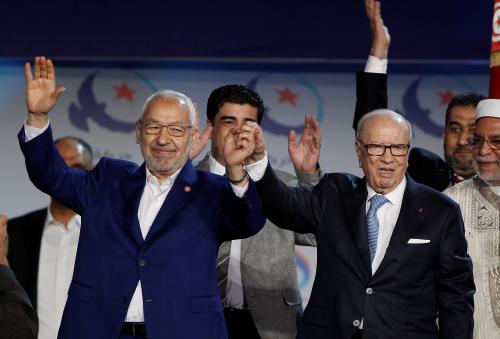
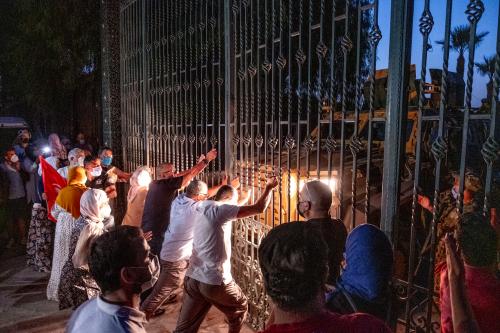
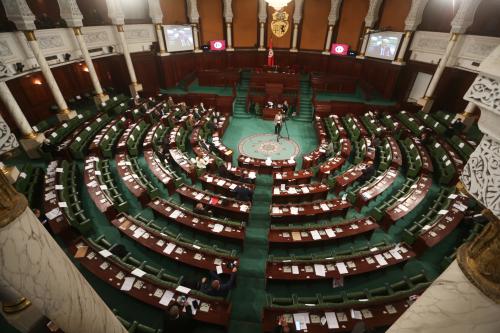
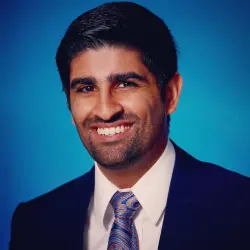
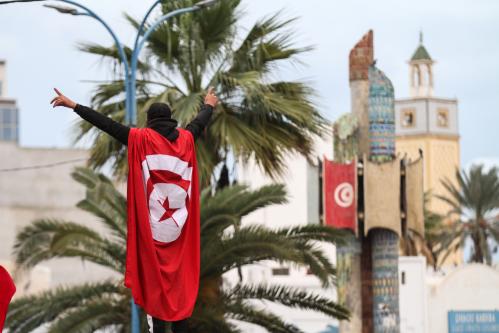
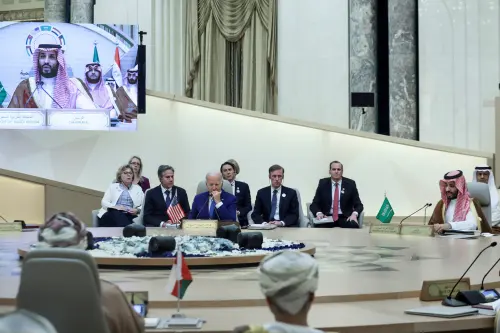
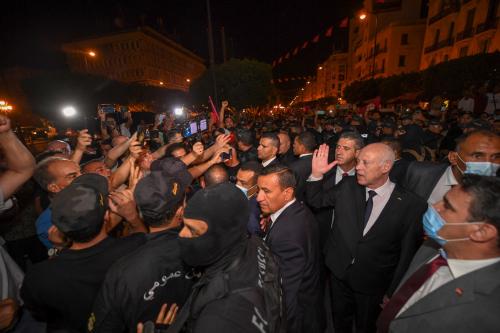
Commentary
Why the West must continue pushing for Tunisian democracy
November 10, 2021